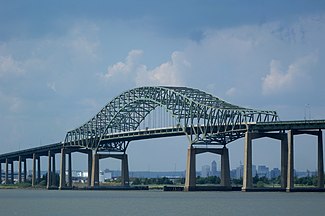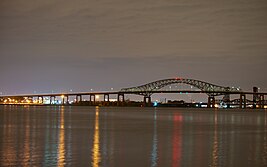Newark Bay Bridge
Newark Bay Bridge | |
|---|---|
 | |
| Coordinates | 40°41′43″N 74°07′06″W / 40.6953°N 74.1184°W |
| Carries | 4 lanes of |
| Crosses | Newark Bay |
| Locale | Newark, New Jersey and Bayonne, New Jersey |
| Official name | Vincent R. Casciano Memorial Bridge |
| Other name(s) | The Turnpike Bridge |
| Maintained by | New Jersey Turnpike Authority |
| Characteristics | |
| Design | Three-span continuous through arch bridge |
| Total length | 9,560 feet |
| Width | 115 feet |
| Longest span | 387.10 meters (1,270.0 feet) |
| Clearance above | 135 feet |
| Clearance below | 135 feet (41 meters) |
| History | |
| Opened | April 4, 1956 |
| Statistics | |
| Daily traffic | 65,000 |
| Toll | Varies by distance travelled on NJ Turnpike |
| Location | |
 | |
The Newark Bay Bridge, officially the Vincent R. Casciano Memorial Bridge, is a steel through arch bridge[1] that is continuous across three spans. It crosses Newark Bay and connects the cities of Newark (in Essex County) and Bayonne (in Hudson County) in New Jersey, United States. It was completed April 4, 1956, as part of the New Jersey Turnpike's Newark Bay (Hudson County) Extension, with a ribbon-cutting ceremony led by Governor of New Jersey Robert B. Meyner.[2]
The main span is 1,270 feet (390 m), with a 135-foot (41 m) clearance over water to allow marine access to Port Newark. The bridge is similar in design to the Delaware River–Turnpike Toll Bridge, and was similar in length to the Francis Scott Key Bridge at Baltimore's Outer Harbor. It runs parallel to the earlier built Lehigh Valley Terminal Railway's Upper Bay Bridge.
This bridge is also known as "The Turnpike Bridge" and "The Turnpike Extension Bridge". It carries traffic on a toll regulated section of Interstate 78 along the New Jersey Turnpike to interchanges 14 through 14A. It provides access from the New Jersey Turnpike's main roadway to Hudson County, New Jersey and the Holland Tunnel. The turnpike route creates the border between Bayonne and Jersey City and then runs northward along Port Jersey, Liberty State Park, and Downtown Jersey City. Hoboken is just north of the entrance to Holland Tunnel which continues to Lower Manhattan in New York City.
From March 2014 until May 2019, during certain hours, the eastbound shoulder of the Turnpike Extension (including the bridge) was opened for normal traffic (by green arrows above, instead of red Xs), for a total of 5 lanes (3 eastbound, 2 westbound).[3] This system was discontinued on May 20, 2019.[4]
There is a long-term capital improvements project to build a new bridge.[5]
-
The bridge at night
-
Under the bridge

See also
[edit]References
[edit]Notes
- ^ NYCRoads.com, Bayonne-Port Newark Bridge
- ^ "NEWARK BAY BRIDGE ON TURNPIKE OPENS", The New York Times abstract, April 5, 1956. Accessed October 7, 2007. "Gov. Robert B. Meyner cut a ribbon to open a two-mile bridge over the Newark Bay between Hudson and Essex Counties today."
- ^ Higgs, Larry (May 28, 2015). "When will NJ Turnpike extension shoulders be open to traffic? Ask @Commuting Larry". NJ Advance Media. Retrieved July 12, 2016.
- ^ Turnpike Authority, New Jersey (April 17, 2019). "NJ Turnpike Newark Bay Extension Eastbound shoulder no longer used as a travel lane on May 20, 2019 as the revised date" (PDF). New Jersey Turnpike Authority. Retrieved April 17, 2019.
- ^ West, Teri (January 6, 2022). "Turnpike Authority says it needs Marist High School property in Bayonne for expansion project". NJ.com.
External links
[edit] Media related to Newark Bay Bridge at Wikimedia Commons
Media related to Newark Bay Bridge at Wikimedia Commons- Newark Bay Bridge Historic Overview
- Bridges completed in 1956
- Toll bridges in New Jersey
- Bridges in Hudson County, New Jersey
- Transportation in Bayonne, New Jersey
- Tolled sections of Interstate Highways
- Interstate 78
- Transportation in Newark, New Jersey
- New Jersey Turnpike
- Continuous truss bridges in the United States
- Road bridges in New Jersey
- Through arch bridges in the United States
- Bridges on the Interstate Highway System
- Steel bridges in the United States
- 1956 establishments in New Jersey



